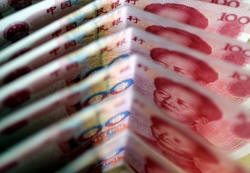|
 Yuan
speculator says China reserves could drop $200 billion
in January Yuan
speculator says China reserves could drop $200 billion
in January
 Send a link to a friend
Send a link to a friend
[January 25, 2016]
LONDON (Reuters) - The monthly fall
in China's hard currency reserves could almost double to around $200
billion in January, bringing Beijing closer to a deeper devaluation of
the yuan, one of the western hedge funds betting big against the
currency said on Monday.
|
|
 A plunge in reserves of $108 billion in December was the biggest
monthly fall on record and one of the factors spurring a wave of
sales of the yuan by Chinese traders and speculative western funds
earlier this month. A plunge in reserves of $108 billion in December was the biggest
monthly fall on record and one of the factors spurring a wave of
sales of the yuan by Chinese traders and speculative western funds
earlier this month.
Chinese reserves have fallen steadily over the past 18 months, from
$3.99 trillion in June 2014 to $3.33 trillion in December.
Omni Macro Fund Chief Strategist Chris Morrison said a change in how
The People's Bank of China intervenes on the offshore market in the
yuan <CNH=> would help push that figure sharply higher this month.
"They are currently reporting zero for the intervention in dollar-CNH,
because they have been rolling over the forwards and never actually
delivering in U.S. dollars," Morrison said.

"What was interesting in January was they didn't roll over the
forwards, so that should be reported and add to the fall in
reserves. January's fall will be larger than December's, I'm
thinking around $200 billion."
Very few of the hedge funds that have rounded on the yuan as
overvalued have been willing to talk about their trading strategies
and the details of China's defense of the currency in wholesale
financial markets. Omni has been betting against the yuan since the
start of 2014.
Morrison, previously a proprietary trader for RBS and JPMorgan, said
that after a "good result" from China's sharp one-off devaluation
last August, the fund had taken more profit on the trade before a
round of strong action by Chinese authorities to stabilize the
currency earlier in January.
He said Omni had re-entered the trade when prices of currency
forwards came back down just over a week ago.
[to top of second column] |

China's FX reserves remain the biggest ever accumulated in nominal
terms and while a fall for the yuan is one of the big consensus
plays among bank analysts this year, most forecasts call for a
decline of less than 10 percent.
Against that are the periodic bouts of panic seen on Chinese
financial markets over the past six months and resulting capital
outflows which have eaten into the reserves Beijing has to resist a
large immediate drop in the yuan's value.
"Something in the region of a 15-20 percent move (in the yuan) is
perfectly reasonable," Morrison said.
"But if China has a crisis, it is radically too conservative. Then
it should be something like the dollar going from 6 to 9. I'm not
just making that figure up to be dramatic, that's just what some
other emerging markets have done, look at Turkey or Brazil."
(Reporting by Patrick Graham; Editing by Catherine Evans)
[© 2016 Thomson Reuters. All rights
reserved.] Copyright 2016 Reuters. All rights reserved. This material may not be published,
broadcast, rewritten or redistributed.

 |